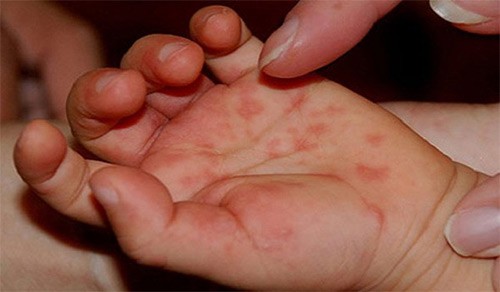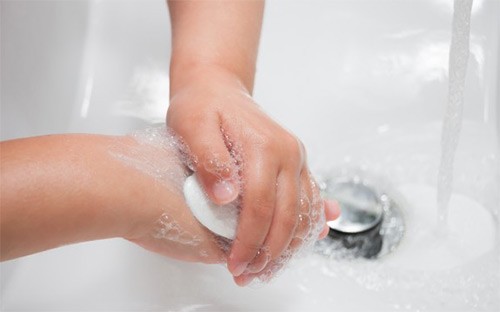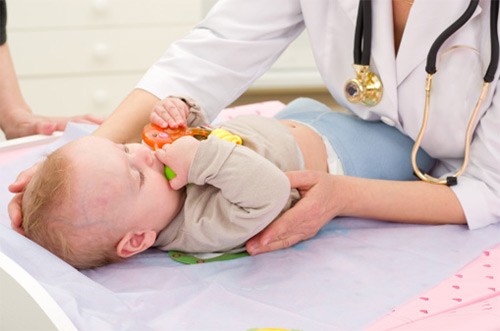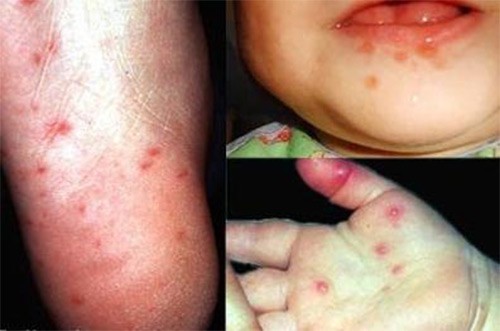Along with the birth of a baby, young parents gain not only joy and boundless happiness. Unfortunately, the world around us is fraught with many dangers, and none of the kids are safe from infection with a variety of infections.
Very often, the symptoms of the diseases are so similar that it is very difficult at first glance to determine which one the child picked up.
Enteroviral diseases are especially dangerous for a newborn baby, because the initial stage of this ailment is very easy to confuse with a cold, and start the wrong treatment.
Enterovirus infection what is it?
The group of enteroviral infections includes many diseases with various manifestations and forms of course (coxsack, leg, mouth, mouth, grpangin), but all of them share the same method of infection. The virus enters the human body from the external environment through the mouth (in exceptional cases, through the nose) and is sent to the intestine, where its active reproduction takes place. The Latin name for the disease comes from the word entero – the stomach.
One of the best known enteroviruses is polio. This disease is familiar to every parent. After all, one of the first vaccinations is given to children in order to prevent precisely this ailment. Vaccination is carried out in 3 stages and is carried out in accordance with the generally accepted vaccination calendar at 3, 4 and 5 months of life.
But if polio was able to create a vaccine, then with other viruses the situation is more complicated. A large number of boles does not make it possible to deal with them by routine vaccination. So, the possibility of a disease of the newborn cannot be ruled out. Most often, children become victims of diseases such as herpangina and the arm of the leg mouth, better known as the Coxsackie virus.

Enteroviruses are thermophilic, so the peak of diseases most often occurs at the end of summer and the first decade of autumn. Most often, outbreaks of diseases are recorded in places of accumulation of a large number of tourists, on the shores of seas and rivers. However, this does not mean at all that in the remaining regions of the country there is no risk of infection.
Enteroviruses tolerate low freezing temperatures well and retain signs of activity even after several freezing cycles. They can “live” outside the human body for a long time. But boiling is the best way to destroy the Coxsackie virus. Therefore, never be lazy to boil a nipple, a bottle and dishes for the preparation of baby food.
After the virus enters the body, the disease does not appear immediately. The first manifestations can be seen only after 3 to 10 days, when the incubation period ends and the disease enters the active acute phase.
How can you get an enterovirus?
The virus most often gets into the baby’s body from adult relatives. Moreover, the parents themselves external symptoms of this disease may not occur at all. This is due to a stronger immunity, which prevents Coxsackie disease from developing. There are also possible options in which adults have acquired resistance to this virus as a result of infection at a young age. But this does not prevent them from being carriers and distributors of a dangerous disease.

A child may become infected:
- Airborne drip;
- Through the dishes, if an infected mom or dad licks a dummy, eat from one plate or use a baby spoon;
- Just one kiss of a sick person is enough for the baby to catch the “infection”;
- If it swallows water in a pool or in an open pond full of viruses;
- With regular visits to crowds at risk in the hot season;
- Orally fecal. Despite the fact that the baby is still small enough, there are huge risks of such an infection. Any toy raised from the ground in a sandbox, on a playground, on the seashore poses a huge danger to the health of crumbs;
- The use of non-boiled water from wells, columns or domestic water can also be a reason for the development of intestinal ailment.
A great danger to others is the fact that a person has been a distributor of enterovirus disease for 5 months.
Compliance with personal hygiene is an essential condition to prevent any enterovirus infection.
Of course, in infants who are breastfed, the likelihood of illness is much lower. Indeed, together with his mother’s milk, he absorbs a large number of antibodies, which to some extent protect him from viruses.
Symptomatology
Common symptoms by which this type of disease can be recognized:
- fever, accompanied by an increase in body temperature to 39 – 40 degrees;
- swollen lymph nodes;
- headache and muscle pain;
- drowsiness;
- vomiting and diarrhea may occur;
- eye pain with visual signs of conjunctivitis (sour eyes, redness of the eyeball, involuntary discharge of tear fluid, fear of bright light);
- rash on the body;
- sores on the mucous membranes of the oral cavity. First, bubbles appear filled with a clear liquid, then they burst and ulcerous formations appear in their place with a whitish bloom;
Treat the baby correctly
To date, there are no special drugs to combat enterovirus infections. Only time and bed rest can help. Usually, children are not hospitalized in the clinic, and treatment is carried out on an outpatient basis at home. The only exceptions are those cases when the parents cannot independently drink the crumbs. Then the baby is taken to the hospital and the necessary solutions are administered intravenously with droppers to prevent dehydration.

Drinking plenty of fluids and oral rehydration solutions is a prerequisite for recovery. Most often, because of severe pain in the throat, the kids refuse to drink. However, parents are required to be persistent and pour liquid into their mouth in small portions and make sure that the baby does not spit, but swallows.
If the disease, in addition to temperature, is accompanied by diarrhea, it is necessary to drink constantly, even through force. Every 5 – 10 minutes, a few sips of liquid – this will be the main treatment.
Suitable antipyretics are given to lower body temperature.
To determine the severity of the baby’s condition, you must consult a doctor. Indeed, in some cases, the disease can be accompanied by complications and affect the internal organs, brain and central nervous system.
Enterovirus is particularly dangerous for children with a disease of the cardiovascular system and with congenital heart disease. Such babies should be treated, under the constant supervision of specialists.
How to replace an oral rehydration agent?
If for some reason you do not have the opportunity to purchase a solution for oral rehydration in the pharmacy network, then you can always prepare it yourself.
All that is needed.
- Rock salt – 3 g;
- Sugar – 20 g;
- Purified drinking water – 1 l.
Mix all the ingredients and drink this baby solution for a day.
Gerpangina
Gerpangina, perhaps this disease is a real scourge for parents of infants. Despite the similarity of names, this ailment has not the slightest relation either to ordinary tonsillitis or to herpes and requires a completely different approach to treatment.
An increase in body temperature to high levels and the appearance of sores in the mouth are the main symptoms of herpangins. Moreover, ulcers affect not so much the tonsils, which is characteristic of a sore throat, as the sky, tongue and cheeks.
The strongest sore throat, which is necessarily present with this ailment, incredibly worries the baby, and this in turn leads to the refusal of food and drink. And if the meal can be delayed for some time, then it is simply necessary to drink the child. The fluid should be ingested regularly, in the greatest possible amount. It can be ordinary purified water, compote, sweet drinks or herbal decoctions.
Please note that drinking cool drinks causes much less pain when swallowing than drinking hot teas. Therefore, drop your fears and give the baby a little water at room temperature.
The lack of the required amount of fluid in the child’s body can lead to bilateral pneumonia in a short time. Sometimes several days are enough for the development of pneumonia, but for its treatment it will take more than one week in a hospital.
In addition to heavy drinking, a child must be given antipyretic drugs. It can be both syrups and tablets, and candles. Be sure to follow the recommendations of the drug manufacturer and do not increase the allowable daily average dose as you wish.
With herpanginum, improvements occur no earlier than 8 to 10 days. During this time, be sure to show the baby to your doctor. Moreover, this must be done on the first day after the temperature rises. Only a doctor can make the correct diagnosis, assess the risks and prescribe adequate treatment.
Hand-foot-mouth
Hand-foot-mouth disease, which affects almost all children during the first 10 years of life. However, it is infants who are especially difficult to tolerate this ailment, because by its nature it is a viral infection spreading in the intestine. And the baby’s body is not yet fully formed, in the digestive tract there is not enough vital enzymes.

Coxsackie virus, probably, there is not a single parent who would not hear about this disease. This is mainly due to the outbreak of the disease on the shores of Turkish resorts.
High fever, rash on the feet, palms, and mouth sores are the symptoms characteristic of an arm-leg-mouth disease. However, one should not think that in all children the manifestations are exactly the same. In some babies, rashes can affect almost the entire skin on the arms and legs, while in others there are very few red spots, pimples. A similar pattern is also characteristic of rashes on the mucous membranes in the oral cavity. Only a few sores may appear, or it can completely sprinkle the tongue, cheeks, palate, tonsils.
As in the case of herpangina, a plentiful regular drink is required. An intestinal infection accompanied by a high temperature very quickly leads to dehydration and complications. In addition to ordinary water, teas, compotes and drinks, it is recommended that the baby be given oral rehydration solutions. This allows not only maintaining the water-salt balance in the body at the proper level, but also contributes to the active removal of toxins from it.
Elevated body temperature should be immediately brought down. Any antipyretic for children of this age group is suitable for this.
Living in a civilized world it is impossible to protect your baby from viral and bacterial diseases. However, to reduce his suffering and bring recovery to adults is quite within reach. But before applying all kinds of tips heard on the forums, and starting an independent treatment, be sure to consult your local pediatrician.



